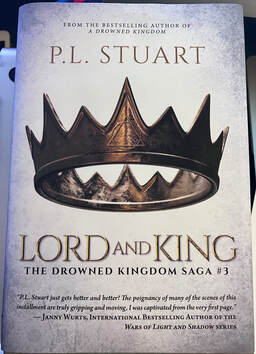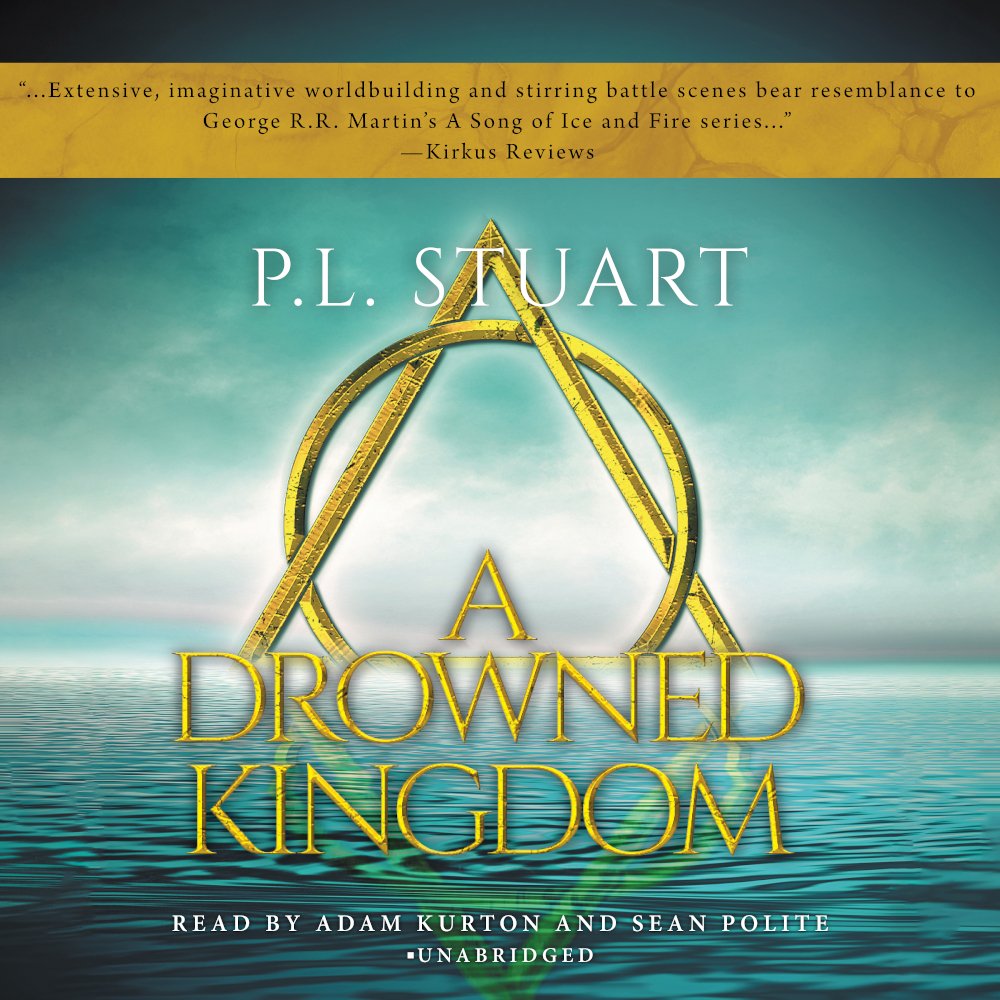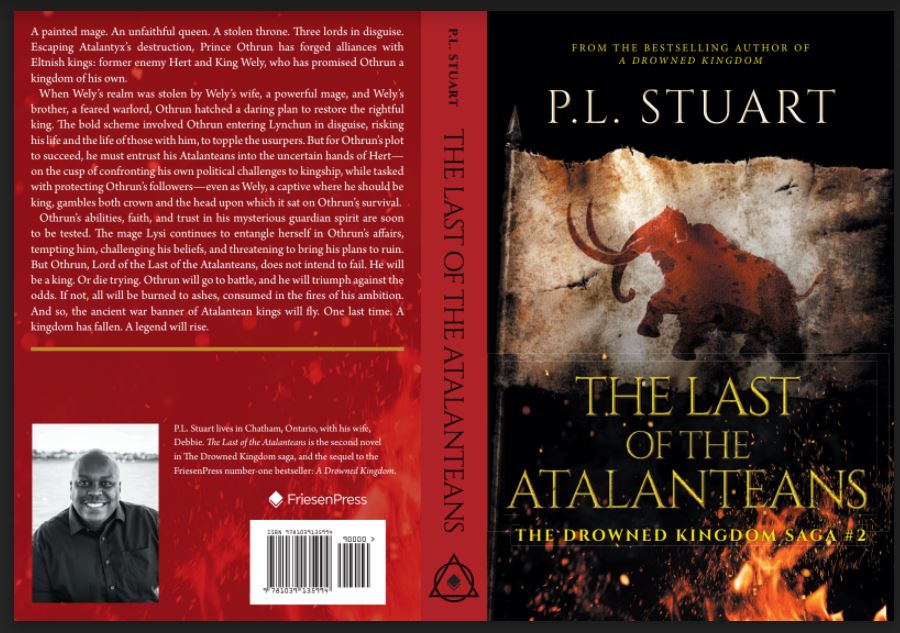|
Review of Lord and King by P.L.Stuart
“A man with outward courage dares to die; a man with inner courage dares to live.”–Lao Tzu If P.L.Stuart’s A Drowned Kingdom was the warmup, and The Last of the Atalanteans the first pitch, then Lord and King is a ninth inning walk-off home run. In this third book, Othrun faces unexpected challenges that make him question his faith, leadership, and moral compass. He must also determine who he can trust among his allies and enemies. Betrayal, in a time of swords and arrows, can often prove lethal. Full disclosure, I received an Advanced Reader Copy of the book, which in no way influenced my opinion or the contents of this review. The novel begins strong with a deftly written hook in the first twenty pages. I did not see it coming. Like after a jump scare in a movie, my skin continued to crawl as I read on. I am always filled with physical reactions when I read P.L.Stuart’s novels; this has been true of every single one of his books. I am anxiously expecting the fourth novel in the series, A Lion’s Pride, which is due out next year. In Lord and King, Othrun is a marked man, a target on his back, and needs allies if he is to attain his—let’s be honest here—egotistical desire to rule the entire continent of Acremia. Yes, Othrun, Lord and King, Othrun the bigot, Othrun the racist and bloodthirsty knight is back, and he is in charge, or so he thinks. Othrun is perhaps the most complex character I have ever read. The reader gets a glimpse into Othrun's fractured psyche through his internal conflicts between his upbringing and the outside world. Othrun the King is flawed in many ways, but it is his ability to be human, to mourn in the face of great losses, to listen and consider other’s points of view, to feel, portrayed with Stuart’s usual literary brilliance, that connects me to the sometimes unlikeable protagonist. I love the idea that someone raised with prejudice does not have to be locked into a singular way of thinking. Will Othrun become the good man he believes himself to be? In book two of The Drowned Kingdom Saga, Othrun states, “All good kings are killers, and all kings good killers.” However, in Lord and King, we see another side of Othrun. A king who asks not only if he will be a good king, but if he is a good man. Othrun, it seems, has grown a conscious. As in Stuart’s previous novels, he tackles some difficult themes; bigotry and racism are openly discussed, and not in pursuit of solutions. Thematically, Othrun serves as a powerful societal metaphor. His strict adherence to Atalantean values in a land with divergent views represents the inherent tension in any society undergoing cultural or political change. His struggle to balance these contrasting values mirrors the real-world challenges faced by leaders in multicultural societies. P.L.Stuart’s Lord and King is an epic tale of political ambition, power-hungry struggles, and moral quandaries, set against the beautiful backdrop of a world steeped in intricate and fascinating histories. Stuart’s genius when it comes to writing engaging and vivid accounts of the brutal world of medieval warfare cannot be understated. I often re-read these scenes as in the moment I am furiously turning the page to find what’s next, such is the frenetic pace of these violent clashes. I am very much looking forward to the fourth book in the saga next year and the remaining novels of this seven-book series. I am also humbled that P.L.Stuart chose my review of The Last of the Atalanteans to be published in the reviews section of this book.
0 Comments
In P.L. Stuart’s wide-ranging, high-fantasy, debut novel A Drowned Kingdom, Othrun, the second Prince of Atalantyx faces an emotional and dramatic journey of loss and redemption.
Having lost his family and kingdom to a cataclysmic seismic event, which itself is a purposeful and beautiful retelling of the legendary story of Atlantis, Othrun must lead his few surviving people to safety in the face of formidable enemies that wish to see him perish at their hands. While on this unexpected odyssey, Othrun struggles with internal crises of faith, of moral code, and personal identity. He wants nothing more than to be a great leader, to feed his ego with victory. But Othrun is a complicated man, and faced with mounting, irrefutable evidence, he begins to question his kingdom’s long held beliefs. Throughout the novel, Stuart brilliantly builds tension between his characters that more than once evoked in this reader a physical, emotional reaction; hairs raised, goosebumps and shivers normally reserved for late night movies and gaming. Epic, physical battle scenes and detailed character networks merge with a mythological history reminiscent of Tolkien’s legendary imagination that draw the reader in to a page-turning hero’s journey. Stuart’s masterful storytelling allows the reader to enter this world’s deep, historical mosaic at a gentle pace, like slipping into cool lake waters that seemingly warm over time. His writing and pace intensifies as we learn more of Othrun’s world, ending chapters with such powerful prose as, ”Fools fall for tricks. Fools then fall.” This novel asks some difficult societal questions, bringing themes of piety, racial divides, colonization and bigotry that challenge the reader to ask deeper questions of the protagonist, Othrun, and understand that while his opinions may be flawed, there exists in him the possibility for change, and that this is not a simple or one-sided task. A Drowned Kingdom takes place in an intricately designed and complex world, worthy of comparison to the works of Tolkien, Martin, and Jemisin. P.L. Stuart is just getting started, and I believe this series will rise to the top of its genre, winning well-deserved awards along the way. A Drowned Kingdom is a fantasy novel not to be missed. My first review!
I'll be posting reviews of my fellow Indie authors as I manage my way through my ever increasing TBR list here. The Last of the Atalanteans Fantasy author P.L. Stuart graces the pages of the second installment of The Drowned Kingdom Saga with bloodshed, deception, and a hero’s search for affirmation in the The Last of the Atalanteans. Stuart deftly spins long allegories of lore and legend into blinding moments of conflict, both internal and physical, as we learn more of Othrun’s past while he journeys forward into battle facing new foes, and forging new alliances. Full disclosure, I received an Advanced Reader Copy of the book, which in no way influenced my opinion or the contents of this review. Beginning where the first book left us hanging from a cliff’s edge, we find ourselves immersed in Othrun’s false quest. As Stuart beautifully writes, “A game. A play. Theatre.” A band of liars set to infiltrate the ancient Goldhall and return the throne to King Wely, rightful King of Lynchun. This is a story of mages and spirits and swordplay, told through the narrow but widening eyes of Othrun. Ost, as he is now known, comes from a bigoted and closed-minded family of rulers now long dead. And while Ost retains these traits, we see in him the ability to grow beyond the values he was saddled with since birth. Stuart tackles some difficult themes here; racism, bigotry, sexism, and shows how a mind can be changed over time as Ost softens to his new and only world. A world he desires to rule. Parts of this book read like a raid in World of Warcraft. Frantic, visceral sword-fights amongst vast battle scenes where Stuart brilliantly focusses his lens to keep the reader not only engaged, but begging for more. I could read 500 pages of P.L. Stuart’s armed skirmishes, he is a master of medieval conflict. And so he should be. With a degree in English, specializing in Medieval literature, Stuart is well-versed on the subject. The author treats us to some brilliant prosaic dialogue amongst his furious storytelling. Gems such as, “With the blush of dawn,” and “All good kings are killers, and all kings good killers.” These lines had me physically nodding not only in recognition of great writing, but in agreement with the characters. In these moments I had suspended all disbelief in the face of Stuart’s clear glass prose. Although the book begins by enveloping the reader in Ost’s and Atalantean history, which as we know is only written by the victor, by the end of Part One, the creeping build up to action hooks the reader as the mammoth arrives in Part Two. From here forward the story continues to increase in momentum through well-written tension-building and violent conflict. By the end of the novel, (spoiler) we are grateful for a moment of calm, and yet left wanting more. The Last of the Atalanteans is an illuminating insight into a man once bound by tradition and aging beliefs who has lost his history, wiped form the planet by a cruel stroke of nature, and who must adapt to a new culture in order to fulfill his destiny, to rule the sole Kingdom before him. |
About LucienLucien Telford is the Author of The Sequence, the first novel in a planned quadrilogy, the Emergent Saga. ArchivesCategories |



 RSS Feed
RSS Feed